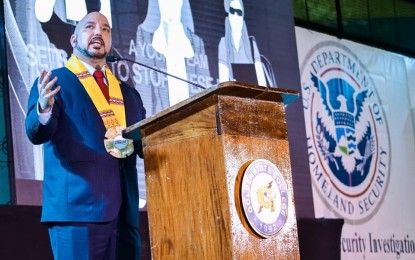
FIGHTING CHILD PORNOGRAPHY. Ricardo Navalta, US Embassy-Manila attaché, introduces Project iGuardian, a campaign that aims to keep children and teens safe from online predators through education and awareness during its launching in the city on Wednesday (Sept. 18, 2019). The city government partnered with the United States (US) Department of Homeland Security for the campaign. (Photo courtesy of the City Public Information Office)
GENERAL SANTOS CITY -- The city government has partnered with the United States Department of Homeland Security (US-DHS) to combat online child and teen pornography and counter other cyber threats against children.
The US-DHS, through the US embassy in Manila, launched a campaign here on Wednesday dubbed Project iGuardian, which aims to keep children and teens safe from online predators through education and awareness.
Ricardo Navalta, US embassy attaché, said the move is part of their efforts to help capacitate local governments and concerned stakeholders in fighting child and teen cyber pornography.
Navalta said Project iGuardian is an outreach effort to share information about the dangers of online environments, how to stay safe online and how to report abuse and suspicious activity.
“IGuardian is the name of the program because we want to protect our children from various forms of cyber exploitation, especially from sexual predators,” he said during the program launching at the city gymnasium.
Navalta said they want to equip children with the right knowledge and information so they would be able to protect themselves.
He said most children and even teens are not well aware of the cyber threats they are facing, especially when using various social media platforms.
The United Nations Children's Fund or Unicef cited that about 80 percent of the children in the country are at risk to online sexual abuse, bullying and other cybercrimes, he said.
The Philippines, Navalta said, is considered as one of the global hotspots for child pornography, and that are currently investigating a number of cases of child pornography in the country.
“Websites, mobile apps and online payment methods have helped accelerate the proliferation of sex trafficking and made-to-order child pornography,” he said.
Janet Ampog, vice president of the Davao City-based Break the Silence National Network, said they have received numerous complaints about children who are forced to pose nude or give nude photographs in exchange for money.
Ampog said one of the primary reasons given by the victims is poverty, with the allure of money considered as a way out of their situation.
In this city, City Councilor Lourdes Casabuena noted that several individuals engaged in child pornography have been charged.
In 2013, agents of the National Bureau of Investigation seized around 15,000 images of young children aged between two and 13 from a child pornography operator based in the city.
A mother was also arrested in the city in November last year for forcing her two children to engage in cyber pornography. (PNA)
